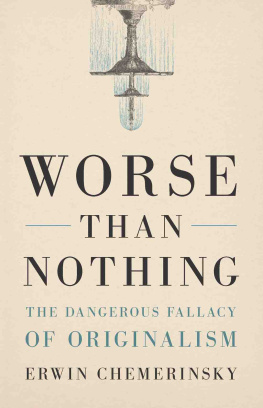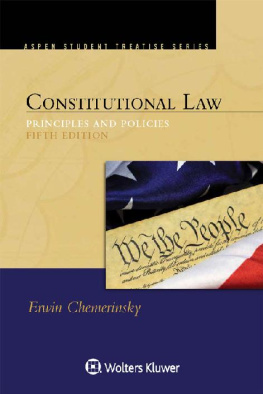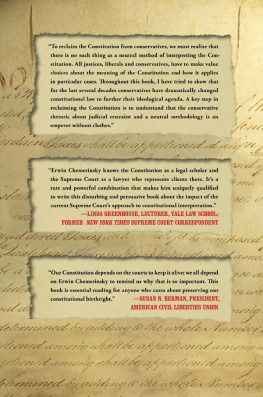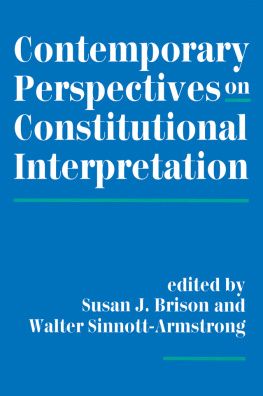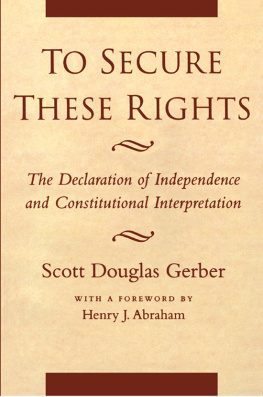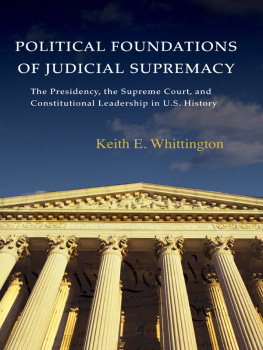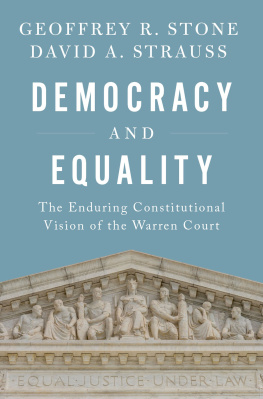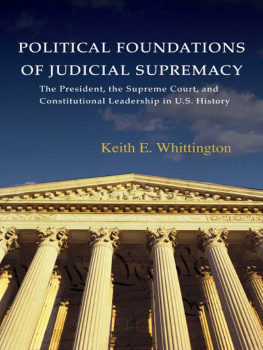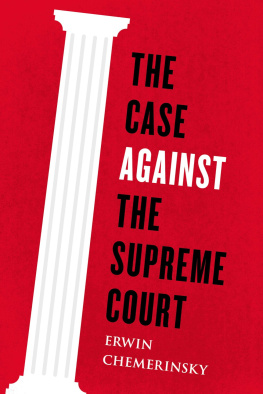WORSE THAN NOTHING

Published with assistance from the foundation established in memory of Philip Hamilton McMillan of the Class of 1894, Yale College.
Copyright 2022 by Erwin Chemerinsky.
All rights reserved.
This book may not be reproduced, in whole or in part, including illustrations, in any form (beyond that copying permitted by Sections 107 and 108 of the U.S. Copyright Law and except by reviewers for the public press), without written permission from the publishers.
Yale University Press books may be purchased in quantity for educational, business, or promotional use. For information, please e-mail (U.K. office).
Set in Yale and Gothic type by IDS Infotech, Ltd.
Printed in Great Britain.
Library of Congress Control Number: 2022932068
ISBN 978-0-300-25990-2 (hardcover : alk. paper)
A catalogue record for this book is available from the British Library.
This paper meets the requirements of ANSI/NISO Z39.48-1992
(Permanence of Paper).
10987654321
For my teachers, and especially Earl Bell and David Zarefsky
CONTENTS
PREFACE
I first taught constitutional law in the fall of 1980. Few people at that point had heard the word originalism. About a decade earlier, Robert Bork had written an article urging courts to adhere strictly to the text and the Framers original intent in interpreting the Constitution.
By the early 1980s, there was a flurry of scholarship on constitutional interpretation. Some of the biggest names in constitutional lawPaul Brest, Ronald Dworkin, John Hart Ely, Larry Tribeadvanced devastating critiques of limiting constitutional interpretation to the text and the Framers intent.
But these criticisms did not stem the growth of originalism. The conservative Reagan administration and especially Attorney General Edwin Meese championed it. In a speech to the American Bar Association in 1985, Meese said that it would be the Reagan administrations policy to advance a jurisprudence of original intention in all of its actions, including in the briefs that it filed and the judges it appointed.
In response to the intellectual attacks, originalism evolved from its initial emphasis on the Framers intent and focused instead on discovering the original meaning for constitutional provisions. It was embraced by many conservative law professors. Even some liberal law professors developed what they called originalist theories, though theirs were much different from the originalism of Bork, Meese, or Scalia.
Today, three of the nine Supreme Court justicesClarence Thomas, Neil Gorsuch, and Amy Coney Barrettare self-described originalists. Three othersJohn Roberts, Samuel Alito, and Brett Kavanaughare quite conservative and often couch their opinions in originalist terms. Donald Trump appointed more than a quarter of all federal court judges now on the bench, including over 30 percent of all the federal court of appeals judges, a great many of whom are Federalist Society members and embrace originalism.
Over the four decades that I have been a law professor, I have watched originalism take hold and become not only a reputable approach to constitutional interpretation but one with a strong following among conservative justices, judges, law professors, lawyers, and law students. There have been powerful, even seemingly devastating critiques of originalism, but they have had little impact.
But I have never found originalism convincing as a viable theory of interpretation. For most constitutional provisions, there is no original meaning to be discovered. Instead, there is a range of possibilities that allows for exactly the judicial discretion that originalism seeks to eliminate. In many areas where an original meaning can be discovered, it would lead to abhorrent results. Partly for this reason, originalist justices frequently abandon the theory when it does not yield the outcomes they want. All of this matters enormously because originalism is a dangerous approach to constitutional law that would jeopardize many basic rights and advances in equality.
Originalisms adherents do not provide an explanation of why it is desirable to follow the views and understandings from centuries ago. The primary purported benefit of originalism is in constraining judges and preventing them from deciding cases according to their personal moral preferences. Does it achieve that goal? I will show that no theory of constitutional interpretation, including originalism, can actually limit judicial discretion. But even assuming for the sake of argument that originalism does this, the question then must be: Do the benefits thus gained outweigh the costs of limiting constitutional meaning to that from 1787, when the document was adopted, or 1791, when the Bill of Rights was added, or 1868, when the Fourteenth Amendment was ratified? This is the crucial inquiry that originalists fail to address. I seek to show that, when evaluated in this light, originalism should be resoundingly rejected as a way of interpreting the Constitution.
My goal in this book is to explain as clearly as I can why originalism is an emperor with no clothes. Most constitutional law decisions inescapably come down to value choices by the justices or judges deciding the cases. Originalism does not avoid that at all. It only allows conservative justices and judges to pretend that they are following a neutral theory when in reality they are imposing their own values.
In this book I describe the rise of originalism, show how its meanings have shifted and how its advocates have defended it over the past few decades, and attempt to explain its allure. I show that originalism fails on its own terms to constrain judging or provide a coherent theory of constitutional interpretation. I then turn to the reasons for this incoherence: the epistemological problem of determining the original meaning or original public understanding of any constitutional provision and why following originalisms premises leads to a rejection of originalism.
Then there is the question of whether originalism is a desirable way of approaching the Constitution. In many areas of constitutional law, it gives us repugnant answers. Being governed by the views and values that prevailed in 1787 or 1791 or 1868 leads to results that rightly would be deemed unacceptable in our very different world. Moreover, there are many constitutional issues on which originalism is utterly unable to provide guidance adequate for our complex technological time. We live in a world that was unimaginable when the Constitution was written and with a government that is necessarily vastly larger than anyone could have foreseen in 1787.
Despite all of this, originalists claim that they have a neutral methodology that they follow to its conclusions. The proof that this is nonsense is that originalists often ignore originalism when it does not lead to their desired conservative results.
What is the alternative? I argue that the approach to constitutional interpretation that has been followed throughout American history has always relied on the wisdom and lived experience of individual judges. In construing a constitutional provision, they inevitably must consult many sources: the text, the Framers intent, the structure of the Constitution, tradition, precedent, and modern social needs. These do not lead to determinate results in constitutional cases. But no theory of constitutional interpretation can do that. There is no way to avoid judicial discretion in constitutional decision-making, or even substantially lessen it. A strict reliance on formalism is impossible in any area, and especially in constitutional law.
Given the current composition of the Supreme Court, originalism will be enormously important in the years ahead. We should be very afraid of where originalism will lead the Court, and afraid for the future of constitutional rights and equality. The Court is now very conservative and likely to remain so for a long time. We are on the verge of major changes in constitutional law, all in a right-wing direction.
Next page
